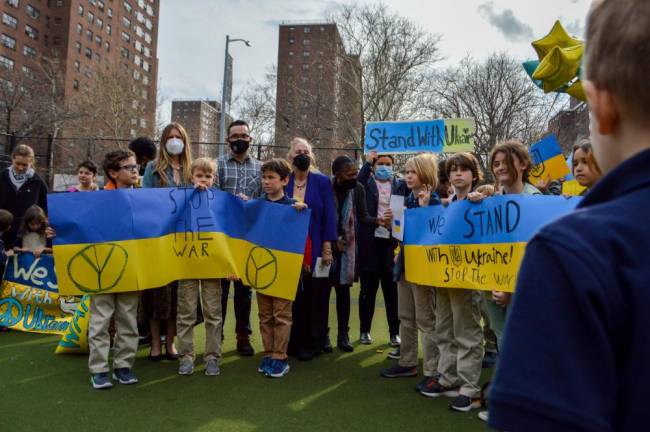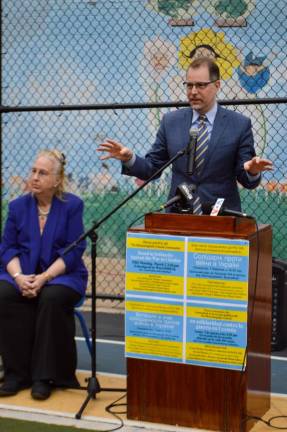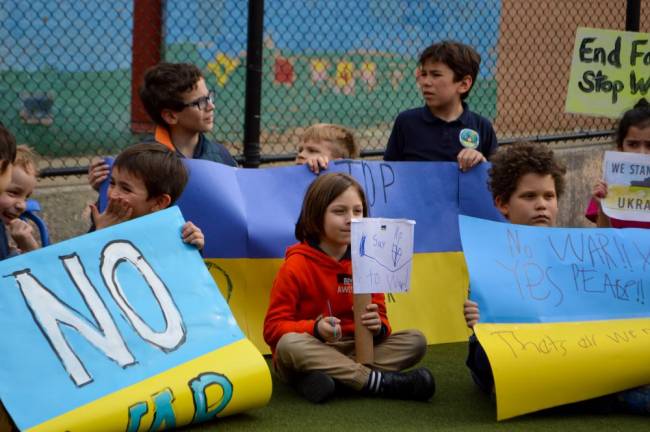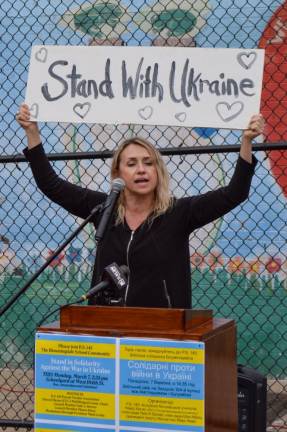Upper West Side Students Rally To Support Ukraine
At the Bloomingdale School, leaders spoke to the power of diversity — and against discrimination
Yellow and blue signs, banners and homemade flags — some larger than those who held them — crowded the schoolyard at P.S. 145, the Bloomingdale School, after classes let out on March 7. They proclaimed a desire for peace, not war, and expressed solidarity with Ukraine. The young students behind the signs were hardly removed from the Russian invasion that has unfolded with shocking speed and severity abroad.
“All my family’s in Ukraine,” one student said, “and I hope the war’s going to end.”
“Even though I’m from Russia, I still stand with Ukraine,” another student told the crowd.
The Bloomingdale School, home to a Russian-language and immigrant community on the Upper West Side, welcomed Manhattan Borough President Mark Levine and Council Members Gale Brewer and Shaun Abreu on Monday to rally in support of Ukraine and its people. Across the city, New Yorkers have gathered for demonstrations since Russia began launching attacks against Ukraine two weeks ago. On the Upper West Side, school leaders and elected officials drove home the message that the conflict in Ukraine ought not to cause conflict here — and that New Yorkers, regardless of their heritage, are stronger together.
“New York City is absolutely united in support of Ukraine and against this war, absolutely united,” Levine said. “People of all backgrounds — Ukrainian-American New Yorkers, Russian-American New Yorkers — people of all backgrounds are united in standing with Ukraine in this moment of trauma.”
Unity in Adversity
Harrowing events abroad have hit close to home for many in the Bloomingdale School community, according to Principal Natalia Russo. “Every single one of our Russian and Ukrainian moms, dads, students, staff members — it’s a little bit difficult to kind of wrap your head around it,” she said. “How do we come in here every single day, how do we best support people that we know are in crisis, emotionally?”
Seventy students participate in the school’s Russian Dual Language Program, which offers classes taught in English and Russian, alternating daily, from pre-K through fourth grade. The goal, according to the school’s website, is for students to achieve language proficiency. “All of you have come together in this program because you want to pass on the treasure of the Russian language to the next generation; the incredible history, the literature, the poetry, the cultural treasure that is the Russian language,” Levine said. “And we don’t want to confuse that with support for this war.”
Speakers at the school rally on Monday emphasized that one’s heritage or language ought not be a reason for discrimination or hate, drawing ties between Russian-Americans and others in the city, like Asian New Yorkers, who have become the target of attacks since the COVID-19 pandemic first began.
“A key lesson that we learn when we suffer discrimination is that we must not only resist it, but also not forget to stand with others who experience the same,” Brewer said. It’s the city’s diversity, speakers urged, that makes it strong. “Don’t let anyone use this crisis to divide New York City,” Levine said.
Beyond rallies and expressions of support from city dwellers, Abreu spoke with The West Side Spirit about the possible impact of seizing property from Russian oligarchs and banning oil imports from Russia.
Activism from children, though, represents a unique kind of hope. “You have the power to change our futures, whether you’re paying attention to me or not,” Abreu said in his remarks to the Bloomingdale community, as students played and posed on the grass with their banners.
“New York City is absolutely united in support of Ukraine and against this war, absolutely united. People of all backgrounds — Ukrainian-American New Yorkers, Russian-American New Yorkers — people of all backgrounds are united in standing with Ukraine in this moment of trauma.” Manhattan Borough President Mark Levine



